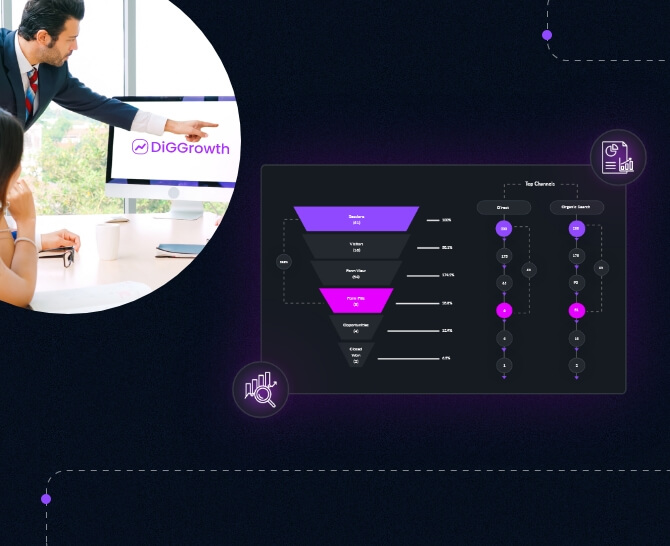
Marketing Analytics 101: 17 Challenges and How to Solve Them
In the first part of this blog series, we talked about what is marketing analytics and how can marketers use it. This second part deep dives into some common challenges and how to solve them.
Billions of people worldwide use the Internet, and every action they take generates data. Savvy marketers know the importance of this data and how marketing analytics can drive effective marketing campaigns. However, marketing analytics has certain challenges and a lack of awareness can jeopardize your marketing campaign.
Here we look at five challenges with marketing analytics and how you can solve them.
Challenges With Marketing Analytics
Unlocking Success: Overcoming Marketing Analytics Challenges
In the digital age, marketing analytics has become the powerhouse of business growth. From tracking website traffic to measuring campaign effectiveness, marketing analytics empowers businesses to make data-driven decisions and stay ahead of the competition. However, the road to harnessing the full potential of marketing analytics is not without its challenges. In this article, we will delve into the definition of marketing analytics, explore its crucial role in driving business success, and shed light on the obstacles that marketers face when it comes to effectively leveraging marketing analytics.
- Lack of Proper Tools and Technologies
- Data Quality and Integration
- Explanation of the challenges related to data quality and integration
- Importance of ensuring data integrity for accurate analysis and decision making
- Lack of Proper Tools and Technologies
- Data Privacy and Security
- Protecting sensitive customer information from breaches or misuse
- Ensuring compliance with regulations
- Implementing encryption techniques to safeguard data
- Regularly conducting data privacy and security audits
- Restricting access to sensitive customer information to authorized personnel only
- Training employees on data privacy best practices
- Partnering with secure data storage providers
- Integration with Traditional Offline Marketing
- Attributing offline efforts to online conversions and tracking ROI
- Measuring the impact of various marketing channels holistically
- Lack of Analytical Skills and Resources
- Training Programs
- Specialized Talent Acquisition
- Collaborative Partnerships
- High Demand
- Cost Constraints
- Skill Diversity
- Training Programs
- Outsourcing
- Collaboration
- Measuring Marketing Attribution
- Aligning Marketing Objectives with Analytics
- Data Quality and Hygiene
- Data Quantity
- The Right People
- Data Consolidation and Integration
- Selecting the Right Attribution Model
Organizations face numerous challenges when it comes to finding, implementing, and utilizing the right marketing analytics tools and technologies. This lack of proper tools and technologies greatly impedes their ability to harness the full potential of marketing analytics.
One of the major challenges is accessing advanced analytics software and data visualization tools. These tools are essential for extracting and analyzing data, identifying patterns and trends, and making data-driven decisions. However, such tools can be expensive and require significant investment, which many organizations may struggle to allocate.
Furthermore, even when organizations have access to these tools, utilizing them effectively requires expertise. Marketers need the knowledge and skills to navigate and interpret the analytics software, as well as the ability to translate the insights into actionable strategies. A lack of expertise in marketing analytics can hinder organizations from fully leveraging the available tools and technologies.
In addition, organizations must constantly stay updated with the latest advancements in marketing analytics tools and technologies. With the ever-evolving nature of the digital landscape, new tools and technologies are constantly emerging. Staying current with these advancements is crucial to stay competitive and maximize the benefits of marketing analytics.
In conclusion, the lack of proper tools and technologies poses significant challenges for organizations in implementing and utilizing marketing analytics. From accessing advanced analytics software and data visualization tools to the importance of expertise in effectively leveraging these tools, it is crucial for organizations to address this challenge to unlock the full potential of marketing analytic
Effective marketing analytics relies heavily on high-quality data and seamless integration between various platforms and systems. However, businesses face numerous challenges in these areas that can hinder the accuracy and reliability of their analysis and decision-making processes.
One of the major challenges businesses face is dealing with inconsistencies, missing data, and lack of data harmonization across different platforms or systems. Often, marketing data is collected from various sources, such as customer relationship management (CRM) systems, advertising platforms, social media channels, and website analytics tools. Each of these sources may use different data formats, structures, or naming conventions, resulting in data inconsistencies.
Additionally, missing data can further complicate the process of data analysis. Incomplete or inaccurate data can lead to flawed insights and incorrect decision-making. Ensuring data completeness and accuracy is crucial for meaningful marketing analytics.
Data integrity is essential for accurate analysis and decision-making in marketing. Without proper data quality and integration, businesses risk basing their strategies on incomplete or erroneous information. Making decisions based on unreliable data can lead to ineffective marketing campaigns, wasted resources, and missed opportunities.
The data may be the backbone of marketing analytics, but it is essential to ensure its integrity through consistent data cleansing, validation, and standardization processes. By maintaining data quality and integrating it seamlessly across various platforms, businesses can enhance the accuracy and reliability of their marketing analytics, resulting in improved insights and better decision-making.
Organizations face numerous challenges when it comes to finding, implementing, and utilizing the right marketing analytics tools and technologies. This lack of proper tools and technologies greatly impedes their ability to harness the full potential of marketing analytics.
One of the major challenges is accessing advanced analytics software and data visualization tools. These tools are essential for extracting and analyzing data, identifying patterns and trends, and making data-driven decisions. However, such tools can be expensive and require significant investment, which many organizations may struggle to allocate.
Furthermore, even when organizations have access to these tools, utilizing them effectively requires expertise. Marketers need the knowledge and skills to navigate and interpret the analytics software, as well as the ability to translate the insights into actionable strategies. A lack of expertise in marketing analytics can hinder organizations from fully leveraging the available tools and technologies.
In addition, organizations must constantly stay updated with the latest advancements in marketing analytics tools and technologies. With the ever-evolving nature of the digital landscape, new tools and technologies are constantly emerging. Staying current with these advancements is crucial to stay competitive and maximize the benefits of marketing analytics.
In conclusion, the lack of proper tools and technologies poses significant challenges for organizations in implementing and utilizing marketing analytics. From accessing advanced analytics software and data visualization tools to the importance of expertise in effectively leveraging these tools, it is crucial for organizations to address this challenge to unlock the full potential of marketing analytics.
Marketing analytics relies heavily on data, and with the increasing importance of data in decision-making, ensuring privacy and security has become a major concern. As businesses collect massive amounts of customer data for analysis, it is crucial to address the risks associated with data privacy and security.
There are two main concerns when it comes to data privacy and security in marketing analytics:
Data breaches can lead to significant financial and reputational damage for businesses. Customers trust companies with their personal information, and any breach of that trust can have long-lasting consequences. Therefore, it is vital for businesses to implement robust security measures to protect customer data.
In addition to protecting customer data, companies must also comply with regulations such as the General Data Protection Regulation (GDPR) and the California Consumer Privacy Act (CCPA). These regulations outline strict guidelines for data collection, storage, and usage, with severe penalties for non-compliance. Therefore, businesses need to ensure that their marketing analytics practices align with these regulations to avoid legal issues.
Strategies to maintain data privacy and security while benefiting from marketing analytics insights:
By taking these measures, businesses can mitigate the risks associated with data privacy and security while leveraging marketing analytics to gain valuable insights and drive effective decision-making.
Integrating traditional offline marketing efforts with online marketing analytics presents its own set of challenges in the fast-paced digital landscape. In this section, we will explore these challenges and discuss potential solutions.
One major challenge is effectively attributing offline marketing efforts to online conversions. While online analytics tools provide a wealth of data on digital channels, tracking the impact of offline marketing activities can be more complex. Marketers often struggle to determine how offline advertising, such as billboards or television ads, contribute to online conversions.
Solution: Implementing unique tracking mechanisms can help bridge the gap between offline and online efforts. By using specific URLs or promotional codes in offline campaigns, marketers can track conversions and attribute them accurately. Additionally, integrating CRM systems with online analytics can provide valuable insights into the customer journey, making it easier to measure the impact of traditional marketing efforts.
Integrating offline and online marketing also presents the challenge of measuring the impact of various marketing channels holistically. With multiple channels involved, it becomes crucial to understand how each contributes to the overall marketing goals and customer journey.
Solution: Developing a comprehensive analytics strategy that encompasses both offline and online channels is essential. By leveraging marketing analytics platforms that allow for cross-channel tracking and comparison, marketers can gain a holistic view of their campaigns. This enables them to allocate resources effectively and make data-driven decisions across all marketing initiatives.
Addressing the challenges organizations face in finding or developing skilled professionals in marketing analytics:
Invest in comprehensive training programs to develop analytical skills within existing teams.
Hire professionals with specialized expertise in marketing analytics to fill the skill gaps.
Build partnerships with external agencies or consultants that specialize in marketing analytics to access their expertise and resources.
The shortage of analytical skills and resources:
The growing demand for skilled professionals in marketing analytics poses a challenge in finding suitable resources.
Limited budget allocation towards hiring or training resources in marketing analytics.
Identifying professionals with both analytical skills and industry-specific knowledge can be difficult.
Strategies to overcome this challenge, such as training programs or hiring specialized talent:
Develop in-house training programs to upskill existing employees and enhance their analytical capabilities.
Partner with external agencies or consultants to access their pool of skilled professionals.
Foster collaboration between marketing teams and data analytics teams to leverage existing skills and resources.
Measuring marketing attribution poses significant challenges in determining the true impact and attribution of marketing efforts. With numerous marketing channels and touchpoints involved in a buyer’s journey, accurately attributing conversions can be complex.
One of the main challenges is identifying the most effective marketing activities in driving conversions and revenue. With various marketing initiatives running simultaneously, it becomes crucial to understand which activities contribute the most to the desired outcomes.
Accurately allocating resources based on marketing attribution insights is another significant challenge. Without clear attribution data, it becomes challenging to distribute marketing budgets effectively and optimize return on investment.
In order to overcome these challenges, marketers must align their marketing objectives with analytics. This involves setting specific goals and KPIs, which can be measured accurately to track marketing attribution.
Furthermore, demonstrating return on investment (ROI) becomes essential in justifying marketing expenditures. By understanding the attribution of marketing efforts, marketers can measure the impact on revenue and effectively communicate the value of their marketing strategies to stakeholders.
Lastly, change management and organizational adoption play a vital role in successfully implementing marketing analytics. Marketers need to ensure that teams are equipped with the required analytical skills and resources to leverage marketing attribution insights effectively.
When it comes to marketing analytics, one of the biggest challenges that businesses face is aligning their marketing objectives with the insights and data provided by analytics tools. Without proper alignment, the valuable insights offered by analytics can go to waste.
To address this challenge, businesses should start by clearly defining their marketing goals and objectives. These goals should be specific, measurable, attainable, relevant, and time-bound (SMART). By doing so, businesses can ensure that their objectives are aligned with their overall marketing strategy.
Once the goals are defined, the next step is to select relevant metrics for measuring success. These metrics should be aligned with the defined objectives and should provide meaningful insights into the performance of marketing campaigns. For example, if the objective is to increase website traffic, metrics such as page views, unique visitors, and conversion rates can be used to measure success.
Translating analytics findings into actionable marketing strategies is another crucial aspect of aligning marketing objectives with analytics. Businesses should carefully analyze the insights provided by analytics tools and use them to inform their marketing decisions. For instance, if analytics reveal that a particular social media platform is driving a significant amount of traffic, businesses can allocate more resources to that platform and develop targeted campaigns.
Data is the fuel for marketing analytics. Poor data can lead to misleading interpretations and guide your business down the wrong decision-making path. Focus on data hygiene, where you cleanse raw data to make it consistent, free of error, and accurate. Do away with duplicate entries, incomplete data, and outdated data.
The volume of data plays a vital role in marketing analytics. Lack of data can be a significant obstacle to getting a clear idea of how your campaigns perform and what your customers think about you. However, too much data from multiple sources sans quality can lead to erroneous interpretations. You can overcome this challenge by ensuring that data from multiple sources is standardized before you analyze it.
Marketing analytics requires skills, and most small and medium businesses lack a skilled in-house analytics team. It can become a handicap and lead to poor data analysis and erroneous interpretation. Finding the right people for this task isn’t easy, but can be solved with a marketing analytics software.
Data consolidation and integration are one of the biggest hurdles to deal with on the way. Your business interacts with customers across multiple platforms. When you collect data from different platforms, it needs to be cleansed and integrated. There are many marketing analytics softwares that can help with data consolidation and integration.
Attribution modeling can help businesses choose the most potent marketing channels. Though given that there are many different attribution models, most businesses need to undergo trial and error to see which one works best for them. Even here, most marketing analytics softwares have in-built attribution models that make it easy to select the right attribution model.
Is Marketing Analytics Software the Answer To Your Problem?
As you know, marketing analytics involves an in-depth analysis of marketing data. Though most businesses have tons of marketing data, they lack the means and process to turn it into actionable information.
Marketing analytics software gathers marketing data from different sources and consolidates this into insightful reports. They help you make data-driven marketing decisions and study the deeper trends available in your data to increase sales, customer retention, and satisfaction.
Capabilities To Look for In A Marketing Analytics Software
Choosing a marketing analytics software can be challenging as you will be overwhelmed with options. Here are a few capabilities your marketing analytics software must have –
- Connect Multiple Marketing Channels and Platforms
- Choose the Best Attribution Model
- Collate and Generate Holistic Reports
- Maintain Data Integrity
- Quantify Marketing Influence on Pipeline and Revenue
The software you choose must be able to connect to multiple marketing channels and platforms. It should automate the process of data collection and management. Your software must create a single customer profile irrespective of the touchpoints in the buyer’s journey.
Choosing the right attribution model is vital for in-depth analysis. Your software must help you choose a suitable attribution model based on your business model, touchpoints, and target audience.
The software must collate and generate holistic reports, offer you actionable insights on the dashboard, and let you gain predictive intelligence on your marketing activities.
Data accuracy, relevance, and consistency are vital for generating insights. Your software must help you maintain data integrity so as to help you elevate your marketing effort and move to revenue-focused marketing.
The software should let you measure the impact of the different campaigns on sales and revenue. You must gain a clear picture of successful campaigns and ones that require tweaks.
Marketing analytics is the future of marketing in a competitive world where data and information would be the driving force for success. It is important to overcome these challenges and choose the right marketing analytics software to stay ahead in the race.
Wish to Become a Revenue-Focused Marketer? Talk to Us!
Our AI-driven, no-code marketing intelligence platform, DiGGrowth, gives you the ability to justify your marketing spend by demonstrating the ROI of your marketing activities. Alternatively, feel free to write to us at info@diggrowth.com and we will get back to you.
Ready to get started?
Increase your marketing ROI by 30% with custom dashboards & reports that present a clear picture of marketing effectiveness
Start Free Trial
Experience Premium Marketing Analytics At Budget-Friendly Pricing.

Learn how you can accurately measure return on marketing investment.
Additional Resources
Don’t Let AI Break Your Brand: What Every CMO Should Know
AI isn’t just another marketing tool. It’s changing...
Read full post postFrom Demos to Deployment: Why MCP Is the Foundation of Agentic AI
A quiet revolution is unfolding in AI. And...
Read full post postAnswer Engine Optimization (AEO): The New Frontier of SEO in 2025
As digital experiences continue to evolve, so does...
Read full post postFrequently Asked Questions
Data quality and hygiene are crucial in marketing analytics as poor data can lead to misleading interpretations and incorrect decision-making. By focusing on data hygiene, which involves cleansing raw data to ensure consistency, accuracy, and freedom from errors, businesses can avoid misleading insights. Eliminating duplicate entries, incomplete data, and outdated information is essential for maintaining data quality.
Data quantity plays a vital role in marketing analytics because it provides a clearer understanding of campaign performance and customer sentiment. Insufficient data can hinder accurate analysis and insights. However, an excessive volume of data from multiple sources, without proper quality standards, can lead to flawed interpretations. To address this challenge, it is crucial to standardize data from various sources before conducting analysis.
The absence of a skilled in-house analytics team can impede effective marketing analytics and result in inaccurate interpretations. Small and medium businesses often face challenges in finding the right people for data analysis. However, this challenge can be overcome by leveraging marketing analytics software, which can compensate for the lack of skilled personnel and provide accurate insights.
Data consolidation and integration pose significant hurdles in marketing analytics. With businesses interacting with customers across multiple platforms, data collected from different sources needs to be cleansed and integrated. Marketing analytics software can assist in overcoming this challenge by offering solutions for data consolidation and integration, ensuring a seamless flow of information for accurate analysis.
Selecting the right attribution model is crucial for businesses in order to identify the most effective marketing channels. With various attribution models available, businesses often need to experiment to determine which one works best for their specific needs. Many marketing analytics software options include built-in attribution models, simplifying the process of selecting the most suitable model for accurate data analysis and decision-making.
 Shahzad Mussawir
Shahzad Mussawir  Arpit Srivastava
Arpit Srivastava 

